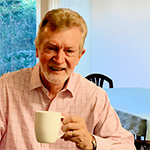
Three friends approach a pedestrian crossing near a busy intersection. As the traffic lights change, vehicles hurry through the road junction where they are to cross.
One friend rushes anxiously across, beating the oncoming cars.
Out of self-preservation, another stands steadfast on the curb.
The third fearfully steps backwards.
They look at one another and laugh; they know each other so well. The first took ground, the second held ground, and the third gave ground.
The friends can stand for distinctive life stances within us. Do we recognise and befriend these inner stances as the friends did?
While we might have a nodding acquaintance with these life stances, often we default to one approach, particularly in a crisis.
What is your unconscious life preference? Do you
- Take ground?
- Hold ground?
- Give ground?
While we easily default to a preferred stance, freedom involves choosing not to stay stuck in our default position.
This is not a one-off choice; it is a daily struggle. A tussle to keep returning to a place of interior freedom.
Such freedom invites us to embrace our frail humanity instead of assuming we can be free from our humanness.
To learn more about these three life stances, the forthcoming Introduction to the Enneagram workshop will assist. To register, CLICK HERE